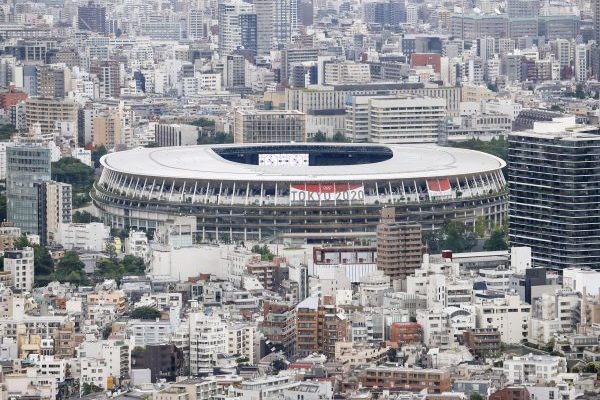Tokyo’s Olympic countdown

The Tokyo Olympic Games are set to kick off in less than one month. The decision to proceed in the middle of the COVID-19 pandemic is steeped in controversy. But Japanese Prime Minister Yoshihide Suga and the International Olympic Committee (IOC) have demonstrated a stubborn resolve, despite public opposition in Japan and pandemic-associated risks.
Controversy is nothing new in Tokyo’s history with the Olympics. In 1936, against the backdrop of the Mukden Incident in 1931 and Japan’s withdrawal from the League of Nations a few years earlier, Tokyo unexpectedly became the first non-Western city to be awarded the right to host the 1940 Games. But after the outbreak of the Second Sino-Japanese War in 1937, Japan’s military government announced that it was forfeiting its role as host.
In 1964, Tokyo got a second chance. This tremendously successful Games saw Japan celebrate its return as a member of good standing in the international community after its defeat in the Second World War.
The 1964 Games were used to help transform Tokyo into a renewed city — complete with modern sewage systems, transport infrastructure, 5-star hotels and the Tokyo–Osaka bullet train — to project a new image of Japan as a peaceful, democratic and economically strong country, and to kickstart Japanese global engagement.
The Tokyo 2020 Games were intended to once again symbolise transformation and represent a kickstart to the economy after Japan’s so-called lost decades of stagnant economic growth. This was to be achieved primarily by increasing inbound international tourism and through construction and infrastructure investments associated with the Games.
At the same time, the Games were extolled as a means to showcase Japan’s recovery from the 3/11 Fukushima nuclear disaster, promote ‘brand Japan’ and to regain the country’s status as a global technology leader.
Instead, COVID-19 has hung over the Tokyo 2020 Games like a dark cloud.
Japan has gone from just over 1000 COVID-19 cases and 43 deaths in March 2020 when the IOC decided to postpone the Games for 12 months, to nearly 800,000 cases and over 14,500 deaths as of late June 2021. Over 70 per cent of these infections and 75 per cent of deaths came in the first six months of 2021.
As Ben Ascione explains in one of two lead articles in the East Asia Forum this week, the situation has fuelled significant public anxiety and expert warnings about the Games worsening the spread of COVID-19. ‘Leading medical experts, Japanese doctors unions, 60 per cent of Japanese firms and 60–80 per cent of public opinion favour postponing or cancelling the Games.
The head of the Japanese government’s coronavirus panel, Shigeru Omi, stated in Diet testimony that it was “abnormal” to hold the Games during a pandemic. He felt compelled to publicly provide independent research findings that were out of step with the government’. Even Japan’s Emperor Naruhito, who is constitutionally prohibited from intervening in politics, has now added his voice to the chorus of concern.
With 20 per cent of Japan’s residents having received at least one shot and 9 per cent being fully vaccinated, medical experts have warned of the risk of a fifth wave of infections and deaths in Japan. Even greater is the risk that the Games could become ‘an incubating ground for a “Tokyo Olympics” variant [of the virus], further delaying the global recovery if returning athletes and personnel spread COVID-19 across the world’.
The economic imperatives also do not add up. The Nomura Research Institute (NRI) estimates that by holding the Games this summer Japan will generate an economic benefit of between 1.81 trillion yen (US$16.3 billion) and 1.66 trillion yen (US$15 billion), depending on the restrictions in place on domestic spectators.
But this potential benefit is contingent on the Games not worsening the spread of COVID-19 and the government not being forced to call another state of emergency. The NRI estimates the first three states of emergency wiped off 6.4 trillion yen (US$57.7 billion), 6.3 trillion yen (US$56.8 billion), and 3 trillion yen (US$27 billion), respectively, from the economy.
The decision to proceed with the Games is dictated by the IOC and the political calculations of Prime Minister Suga.
As Ascione explains, ‘For the IOC it comes down to money. The Olympics generate over 70 per cent of its revenue from broadcast rights. If the Games were cancelled this revenue would be lost and could imperil its future relations with broadcasters and sports federations’.
At the same time, the one-sided nature of the ‘Olympic contract only gives the IOC — not the Tokyo or Japanese government — the right to cancel the Games. The host city is essentially a service provider contracted to stage an event’.
Prime Minister Suga, as Corey Wallace explains in the second lead article, ‘must also face a Liberal Democratic Party (LDP) leadership contest in September’ and a lower house election in October. But because Suga lacks a factional affiliation within the LDP to back him, he ‘is vulnerable to small shifts in opinion within the party’.
At the same time, Suga ‘faces ambitious leadership rivals … who sat quietly in the wings over the last eight years’ under the Abe government. To snuff out challenges to his leadership Suga needs a successful Games leaving him ‘no room for error in his quest to become more than a “caretaker” prime minister’.
Both Japanese lives and delayed global recovery from another major possible virus shock are on the line, as Ascione concludes, if the IOC and Suga’s Olympic-sized bet doesn’t pay off.
This article was published by the East Asia Forum.
Based out of the Crawford School of Public Policy within the College of Asia and the Pacific at the Australian National University, the Forum is a joint initiative of the East Asian Bureau of Economic Research (EABER) and the South Asian Bureau of Economic Research (SABER).













